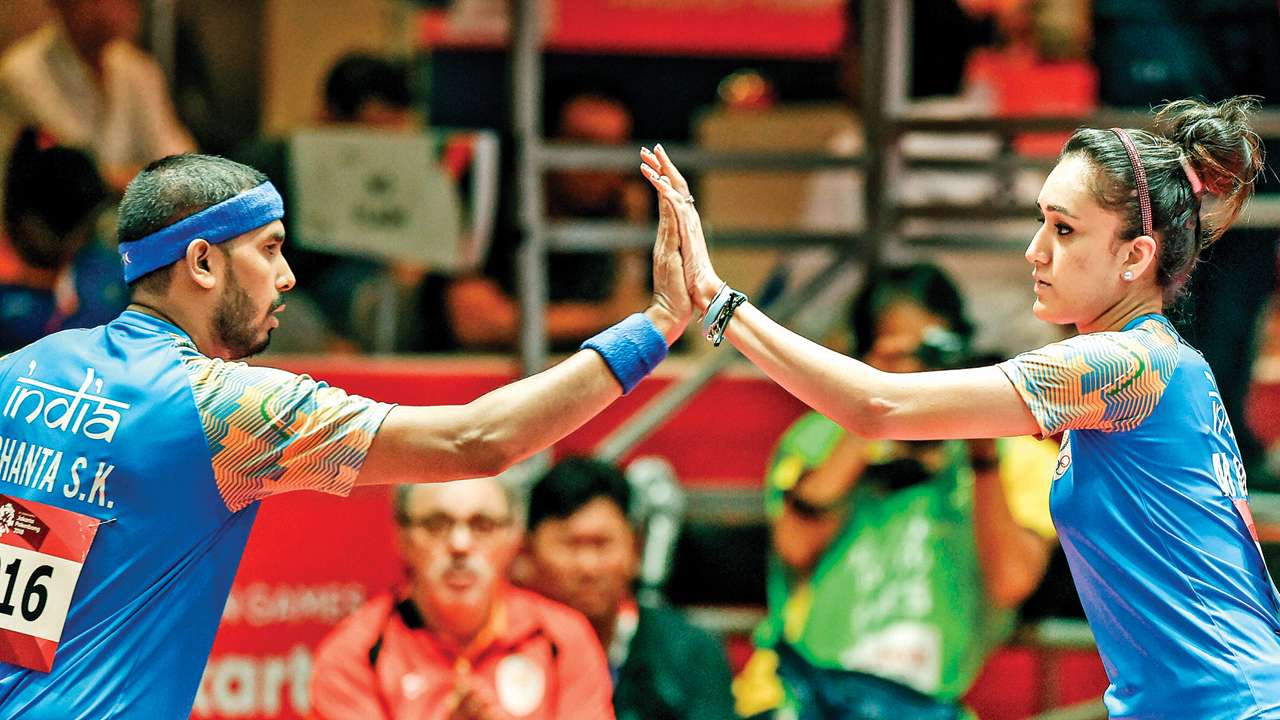
For one, I had already said, 'great chance'. The second, it's out of the world.
Not really, because it was the first time we were playing together. We had literally no idea how things would pan out. Also, I personally didn't see so much of the draw. Most of the times, I was either asking Manika or the coach, 'OK, who are we playing next?' So, it was pretty much like an extempore. I didn't have a lot of time to think, also because on some days, I played four matches a day. I was just playing back-to-back.
Personally, I gave up playing mixed doubles, because mixed doubles is totally dominated by women. If the woman plays well, the man supports. That's how the way of life also is, right? (laughs) That's exactly mixed doubles in table tennis. So, I had given up!
But pairing Manika and I was the idea of our coach at the Commonwealth Games. We both are totally on the opposite sides in terms of our playing style, which normally does not suit a mixed doubles team. But then our coach came up with this idea, that when she stops, I can go for my shots with my power. So we tried it out, and then I felt like, 'OK, it can work'.
Of course, we needed to do a lot of work but then the possibility was there. The negative part was both of us are tall, so both of us need a lot of space on the table. Usually, both of us play with shorter partners but it wasn't the case here. So, I'm glad we overcame that hurdle. But I believe we still have much more in us as a team. If we can work a little harder and practice together, then I think we can make a strong pair.
Yes, because the Olympics have the mixed doubles category. So, why not carry on?
Yes. It's so good for the sport. The kind of mileage that we've got after the Asian Games is really phenomenal. What Manika did at the 2018 Commonwealth Games, it was big. But I think table tennis after the Asian Games has become quite popular among kids, coaches, administrators, everyone. And it will only get better from here on. The budgets are going higher -- it's almost close to double now. So with all this, we should be able to build a good ecosystem for the players now.
So, our achievements are good for the sport more than us as individuals. Of course, people know me by now. Only thing, I probably get a drink for free now (laughs).
Well, it goes both ways. I have a family who expects me to be home. More than them expecting, I want to be home more. So, that can make me feel like, 'OK, I've won Asian Games medal too, so now I can stay home'. But then there's the other side to it as well. I'm playing my best table tennis at this point of time with close to two years to go for the Olympics. Thus, there's motivation there. So, I'll have to balance it out, and do it perfectly. If I can balance my table tennis and my personal life, then I believe this medal will go a long way.
Look, for me, I've always thought that an Olympic medal is a possibility. When I won the CWG medal in 2006, my coaches always told me, 'don't be satisfied with this, you're capable of an Olympic medal'. So, the belief was always there inside me. The major change now has been that the people around me believe that an Olympic medal is a possibility.
The most important thing is fitness, because the sport is getting faster and more physical. That's the best thing for me, because I've never been fitter than what I am now. So, it has to be the key aspect, apart from being motivated to stay away from family and keep it going, because I've been doing that for the last 12-14 years.
My son is growing up, he is one-year-old, he is starting to walk and run. I missed all of that with my daughter, who is seven now. And, it's happening with my son too. All these years don't come back, do they?
The choice depends more on the family and how much it supports you. Because if my wife says, 'pack your bags and come home', I will pack my bags and go home. Like I said, the woman is the boss. So, if your family supports you in your quest to achieve something, then we can go on.
But my family also needs me now. So, I'll have to balance that, and give myself and my family some more time. My daughter keeps asking me, 'Daddy, why do you have to play matches everywhere else, why can't you just play in Chennai?' What can I tell her?
So, the important thing will be planning, and probably playing lesser number of tournaments. But then I need to hit the peak in those tournaments. That's a big challenge.